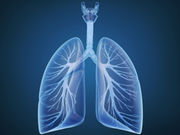Treatments for children don’t appear to offset risk in adulthood
THURSDAY, May 12, 2016 (HealthDay News) — Children with persistent asthma and reduced growth of lung function may be at increased risk for chronic obstructive pulmonary disease (COPD) in early adulthood, according to a study published in the May 12 issue of the New England Journal of Medicine.
Michael McGeachie, Ph.D., an instructor in medicine at Harvard Medical School and Brigham and Women’s Hospital in Boston, and colleagues followed 684 participants in the Childhood Asthma Management Program. When the study began, the children were between the ages of 5 and 12. The researchers followed the children until they were at least 23.
At the end of the study, 11 percent of the young adults were diagnosed with COPD. Other than persistent asthma, risks for COPD included being male and having poor lung function at the start of the study, the researchers said. By the time children with persistent asthma reached early adulthood, 75 percent showed an early decline in lung function or reduced lung growth. Treating asthma in childhood didn’t appear to change these patterns.
“Study participants were children with mild-to-moderate persistent asthma, which places them among the most severe 30 or 40 percent of all childhood asthmatics. Among this group, serious airway obstruction is an early-life possibility,” McGeachie told HealthDay. “There may be interventions that can help mitigate these risks, although we do not specifically identify any.”
Full Text (subscription or payment may be required)
Copyright © 2016 HealthDay. All rights reserved.








